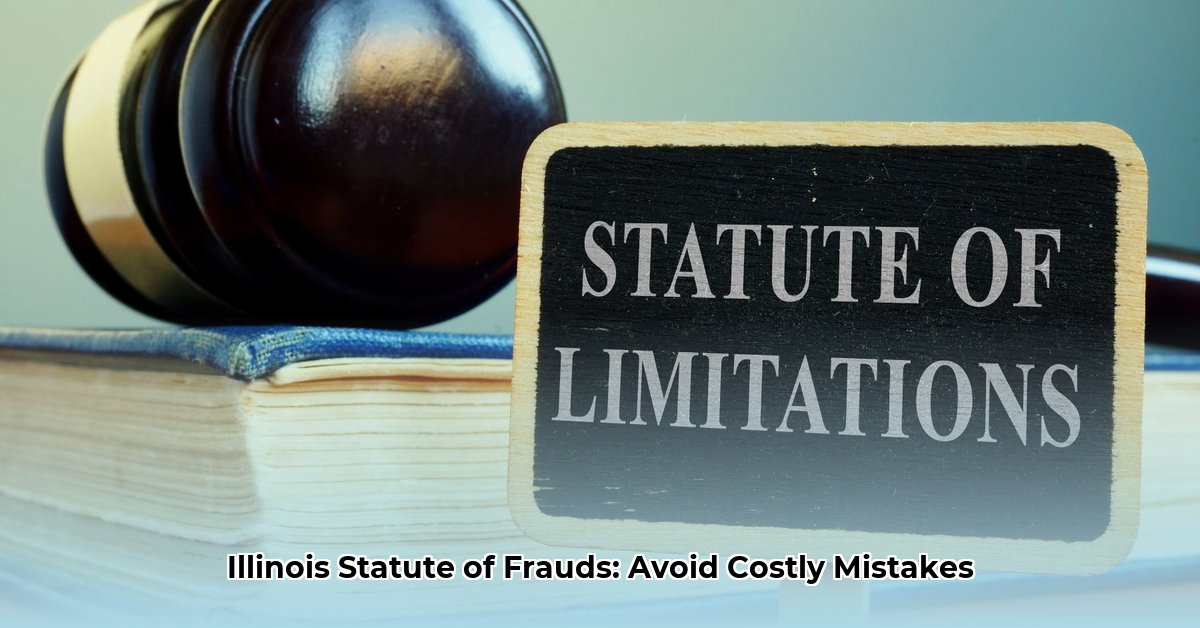
Core Requirements: Navigating the $500 Threshold and Written Agreements
The Illinois Statute of Frauds, a cornerstone of contract law, dictates that certain contracts must be in writing to be legally enforceable. For contracts involving the sale of goods, this threshold is $500. This means any agreement for the sale of goods valued at $500 or more must be documented in writing to be legally sound. Why this amount? It's a safeguard against fraudulent claims. Without written evidence, proving the existence of a contract exceeding $500 becomes significantly more challenging. But what constitutes a "writing"? It's not just formal legal documents; it can be anything from a signed email to a series of text messages demonstrating a clear agreement and signed by the party being held accountable.
Key Requirements:
- $500 Threshold: Contracts for the sale of goods exceeding $500 require a written agreement.
- Signed Writing: The writing must be signed by the party against whom enforcement is sought. This signature acts as a clear indication of their assent.
- Agreement Evidence: The writing must clearly reflect the terms of the agreement, including the subject matter, quantity, and price of the goods.
Exceptions to the Statute of Frauds: When a Written Agreement Isn't Always Necessary
While a written agreement is generally required for contracts exceeding $500, several exceptions exist. Understanding these exceptions is crucial for avoiding potential legal pitfalls.
Specially Manufactured Goods: If a seller begins manufacturing goods specifically tailored to a buyer's order, the contract is enforceable even without a formal written agreement. The start of manufacturing demonstrates a commitment to the agreement.
Admission in Court: If a party admits to the existence of a contract during legal proceedings, the contract may be enforceable even without a written document. This admission acts as compelling evidence of the agreement.
Partial Performance: If the buyer has received and accepted part of the goods, or the seller has received payment for part of the goods, and the value of the partial performance exceeds $500, this implies acceptance of a contract, sometimes even without a signed agreement.
Did you know that courts consistently uphold these exceptions? They recognize that circumstances may justify reliance on the contract without formal written documentation.
Merchant Status and its Impact: Streamlining Modifications
The Uniform Commercial Code (UCC) defines a "merchant" as someone who regularly deals in goods of the kind involved in the transaction. Merchant status significantly impacts how the Statute of Frauds applies to contract modifications.
Modifications Between Merchants: For modifications to existing contracts between merchants, a written confirmation sent by one merchant to another is generally binding even without a signature from the receiving merchant unless they object within 10 days of receipt. This reflects trust and efficiency in established business relationships.
Modifications Involving Non-Merchants: If either party is not a merchant, modifications generally require a signed writing.
Contract Formation and Modification: The Roles of Offer, Acceptance and Consideration
Valid contract formation requires an offer, acceptance, and consideration (something of value exchanged). The Statute of Frauds adds the requirement of a written agreement for sales of goods above $500. Modifying an existing contract often necessitates the same elements—a new offer, acceptance, and consideration—and frequently requires a written modification if the original contract did so. However, in the case of merchants, additional consideration for modifications is not strictly required. This simplification reflects the established business relationships between these parties.
The Parol Evidence Rule: Prior Agreements and Written Contracts
The Parol Evidence Rule prevents the introduction of prior oral or written agreements that contradict a final written contract. In essence, the written contract is the ultimate expression of the agreement. This rule ensures clarity and minimizes disputes by giving precedence to the written document. Thus, if a comprehensive written contract is in place, preceding verbal agreements—even if they contradict the written document—are typically inadmissible in court.
"Reasonable Time" and "Material Alteration": Navigating Ambiguity
Terms like "reasonable time" and "material alteration" can be subjective. "Reasonable time" is determined by the specifics of each case, factoring in industry standards and prevailing circumstances. A "material alteration" is a significant change, not just a minor adjustment. Courts interpret these based on precedents and the specific context of the dispute. For example, in [Case Name, Citation], the court considered [brief summary of how the court interpreted these terms, demonstrating the principle].
Practical Implications and Best Practices: Safeguarding Your Interests
Protecting your business from contract disputes requires proactive measures.
Documentation Above All: Always create a written agreement for sales of goods over $500. This is your primary defense.
Clarity Is Key: Avoid ambiguity in your agreements. Use clear, concise, and unambiguous language.
Professional Guidance: Consult with an attorney for complex contracts or potential disputes. This is a cost-effective measure in the long run.
Record Retention: Maintain detailed records of all communications, agreements and transactions. These records are critical in the event of a dispute.
Conclusion: Navigating the Illinois Statute of Frauds Effectively
The Illinois Statute of Frauds is a vital component of contract law. Understanding its requirements, exceptions, and associated rules ensures that your contracts are legally sound and protects your business interests. Remember, seeking legal counsel is always recommended for safeguarding your business ventures.